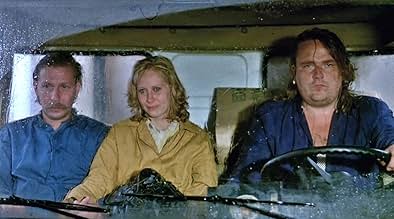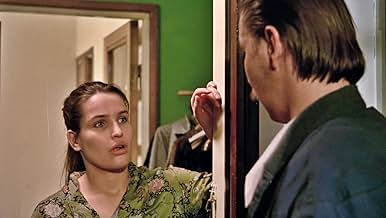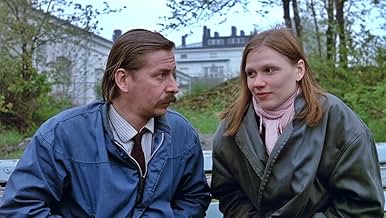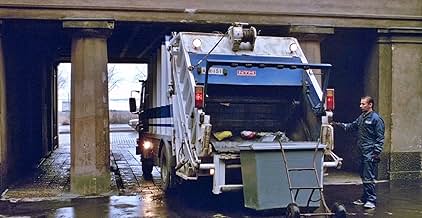PUNTUACIÓN EN IMDb
7,4/10
8,1 mil
TU PUNTUACIÓN
Un episodio en la vida de Nikander, un basurero, implicado en la muerte de un compañero de trabajo, una aventura amorosa y mucho más.Un episodio en la vida de Nikander, un basurero, implicado en la muerte de un compañero de trabajo, una aventura amorosa y mucho más.Un episodio en la vida de Nikander, un basurero, implicado en la muerte de un compañero de trabajo, una aventura amorosa y mucho más.
- Dirección
- Guión
- Reparto principal
- Premios
- 1 premio en total
Safka Pekkonen
- Pianist
- (as Safka)
Mato Valtonen
- Pelle
- (as Markku Valtonen)
Sakke Järvenpää
- Staffan
- (as Sakari Järvenpää)
Reseñas destacadas
(1986) Shadows in Paradise/ Varjoja paratiisissa
(In Finnish with English subtitles)
DRAMA
Written and directed by Aki Kaurismäki the first of three movies of the ""Proletariat Trilogy", that introduces the odd relationship between a garbage man, Nikander (Matti Pellonpää) pursuing cashier, Ilona (Kati Outinen) at a supermarket after his friend and co-worker unexpectedly dies. As we know more about both Nikander and Ilona's daily life routines as well and the glimpse look at the customs of Finnish life, that may resort to complicated situations. Aki's purposeful stoic personalities is on purpose and it works.
Written and directed by Aki Kaurismäki the first of three movies of the ""Proletariat Trilogy", that introduces the odd relationship between a garbage man, Nikander (Matti Pellonpää) pursuing cashier, Ilona (Kati Outinen) at a supermarket after his friend and co-worker unexpectedly dies. As we know more about both Nikander and Ilona's daily life routines as well and the glimpse look at the customs of Finnish life, that may resort to complicated situations. Aki's purposeful stoic personalities is on purpose and it works.
This is a minimalistic film showing the daily struggles of ordinary people. Since the theme is quite universal, it is no wonder then, that the film has aged so well. The issues discussed are still relevant. Two lonely people, Nikander & Ilona, who have a very hard life, try to make a go for it. Unfortunately, things don't go very well since they seem to have nothing in common. Money is always a concern & they have to borrow from friends if they feel like having a good time. But the good thing is that the said friends always come up with the money even if they have to steal from their child's piggy bank! Their hard life has left very little space for appreciating the finer things in life. Once when these ill-matched people try to enjoy themselves in a nice restaurant, the class-conscious maitre d' sends them on their way! The film very beautifully points out that there are some sections of the society who do not have much choice. And yet, the resilience of the human spirit is commendable!
The film has a few flaws too. The relationship between the protagonists goes on again off again so many times that after a point, I started to wonder if it's just a matter of convenience for the both of them or is it real love! Also, I felt that Ilona was a bit too selfish & antisocial.
The film has a few flaws too. The relationship between the protagonists goes on again off again so many times that after a point, I started to wonder if it's just a matter of convenience for the both of them or is it real love! Also, I felt that Ilona was a bit too selfish & antisocial.
Released in 1986, Aki Kaurismaki's VARJOJA PARATIISISSA (Shadows in Paradise) is one of the Finnish filmmaker's earliest efforts, and it stands as one of the most idiosyncratic romantic comedies of all time. The painfully shy Nikander (Matti Pellonpää), a garbage man, means the moody Ilona, a supermarket checkout girl. The film tracks their bumbling attempt to establish a lasting relationship: dates that end as soon as they've begun, a romantic getaway where they each retreat to separate hotel rooms, and rare conversations which employ the absolute bare minimum of words. Nikander's best and only friend Melartin (Sakari Kuosmanen), whom the garbage man only recently met through a spell in jail, gives some needed encouragement.
The film's soundtrack is rooted in early rock-and-roll, though unlike later Kaurismaki films where the characters seem to be living in a 1950s bubble, all the action takes place in contemporary Helsinki. I've criticized Kaurismaki's vision of Finland in other films, but VARJOJA PARATIISISSA does, in my opinion, accurately depict the collection of gloomy, taciturn binge drinkers that are the Finns.
VARJOJA PARATIISISSA is an early work and doesn't show the confidence of later efforts, but it's still quite entertaining, its leads and their struggles extremely charming, and I would recommend the film. Certainly the performances of Pellonpää (in a typical Pellonpää role) and Outinen (who seemingly reinvents herself in every film) will prove quite memorable.
The film's soundtrack is rooted in early rock-and-roll, though unlike later Kaurismaki films where the characters seem to be living in a 1950s bubble, all the action takes place in contemporary Helsinki. I've criticized Kaurismaki's vision of Finland in other films, but VARJOJA PARATIISISSA does, in my opinion, accurately depict the collection of gloomy, taciturn binge drinkers that are the Finns.
VARJOJA PARATIISISSA is an early work and doesn't show the confidence of later efforts, but it's still quite entertaining, its leads and their struggles extremely charming, and I would recommend the film. Certainly the performances of Pellonpää (in a typical Pellonpää role) and Outinen (who seemingly reinvents herself in every film) will prove quite memorable.
After a stunning debut, Crime and Punishment, and a bizarre, experimental second feature, Calamari Union, Aki Kaurismäki began doing what he's best at: telling the stories of Finnish underdogs'everyday experiences. And it all started with Shadows in Paradise, the first installment of the "workers trilogy" (continued with Ariel and The Match Factory Girl), and arguably Kaurismäki's finest film (at least until he made The Man Without a Past). It also marked his first collaboration with Kati Outinen, who has become the very symbol, alongside the late Matti Pellonpää, of Kaurismäki's cinema.
Fittingly, Pellonpää and Outinen are the leading couple of shadows in Paradise. He reprises the role of Nikander he previously played in Crime and Punishment, with more English lessons (which originate his best line, at the end of the film) and trouble at work: his plans to start his own business get buried with his associate (Esko Nikkari), who commits suicide five minutes into the movie. While looking for a new job, he meets Ilona (Outinen), who works as a cashier in a Helsinki supermarket. The two start hanging out, eventually forming a sweet, if platonic, bond, occasionally threatened by Nikander's apparent cynicism.
The film's magic resides entirely in its minimalism: little dialogue, sober settings, raw, Finnish humor, real, likable characters and no overacting, as Kaurismäki tells his simple, universal, incredibly touching love story. Pellonpää and Outinen's understated, affecting performances complete each other, with valuable support from Sakari Kuosmanen as Melartin, Nikander's best friend, who even steals from his own daughter to finance his buddy's dates. Not that his behavior is exemplary, but it shows how much these people care for each other, and that's where Kaurismäki succeeds: he makes us emphasize with these characters despite their many flaws, and delivers an astounding, memorable picture.
A true masterpiece of Finnish film-making, from the best director that country has ever spawned.
Fittingly, Pellonpää and Outinen are the leading couple of shadows in Paradise. He reprises the role of Nikander he previously played in Crime and Punishment, with more English lessons (which originate his best line, at the end of the film) and trouble at work: his plans to start his own business get buried with his associate (Esko Nikkari), who commits suicide five minutes into the movie. While looking for a new job, he meets Ilona (Outinen), who works as a cashier in a Helsinki supermarket. The two start hanging out, eventually forming a sweet, if platonic, bond, occasionally threatened by Nikander's apparent cynicism.
The film's magic resides entirely in its minimalism: little dialogue, sober settings, raw, Finnish humor, real, likable characters and no overacting, as Kaurismäki tells his simple, universal, incredibly touching love story. Pellonpää and Outinen's understated, affecting performances complete each other, with valuable support from Sakari Kuosmanen as Melartin, Nikander's best friend, who even steals from his own daughter to finance his buddy's dates. Not that his behavior is exemplary, but it shows how much these people care for each other, and that's where Kaurismäki succeeds: he makes us emphasize with these characters despite their many flaws, and delivers an astounding, memorable picture.
A true masterpiece of Finnish film-making, from the best director that country has ever spawned.
The first part of AKI's "worker" trilogy is also the first time to see his works. It basically meets the expectations. The shooting is not artificial. It completely and truly restores the face of the bottom society in Finland and the various problems that men have to face in their life. In some places, people's loneliness is well interpreted, which is worthy of the word "lonely shadow" in the title. The director himself is also very handsome. He is not an ordinary actor at first sight. He looks forward to his future works.
¿Sabías que...?
- CuriosidadesTowards the end, there's a scene where Nikander's friend talks about a problematic fellow worker named Mikkonen. Matti Pellonpää, who plays Nikander here, would later play Mikkonen in Ariel (1988), the second part of the Proletariat trilogy directed by Aki Kaurismäki.
- PifiasWhen Nikander and Ilona leave the gas station and ride down the road, they pass a white car. The white car is standing still in the middle of the road. Presumably they drove so fast that they passed the white car, but it stands still.
- ConexionesFeatured in Century of Cinema: Scandinavie, Stig Björkman (1995)
- Banda sonoraHerbstlaub
Written by Klaus Treuheit
Performed by Klaus Treuheit
Selecciones populares
Inicia sesión para calificar y añadir a tu lista para recibir recomendaciones personalizadas
Detalles
Taquilla
- Recaudación en todo el mundo
- 298 US$
- Duración1 hora 14 minutos
- Mezcla de sonido
- Relación de aspecto
- 1.85 : 1
Contribuir a esta página
Sugerir un cambio o añadir el contenido que falta

Principal laguna de datos
By what name was Sombras en el paraíso (1986) officially released in India in English?
Responde

























